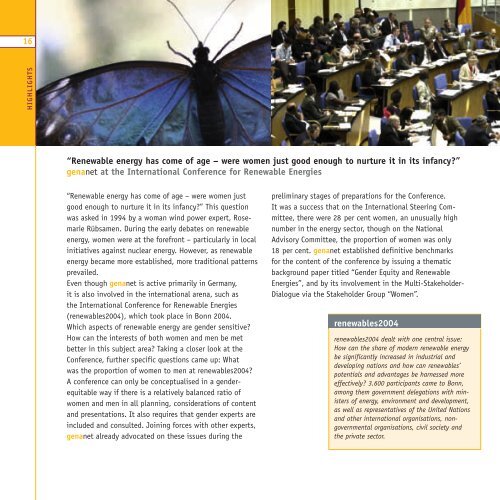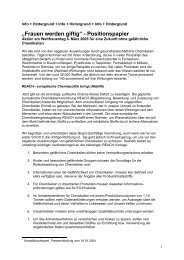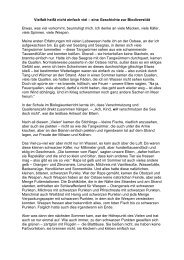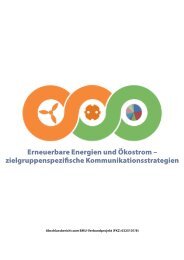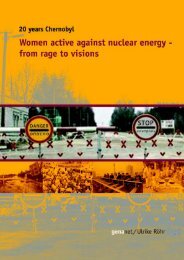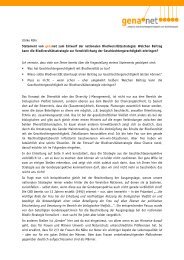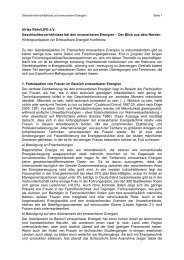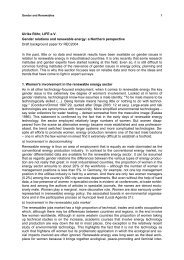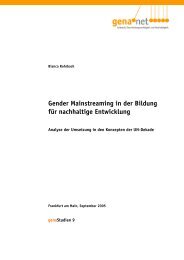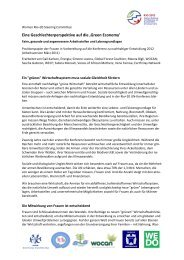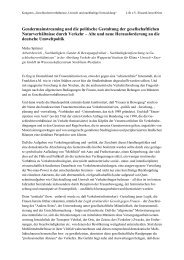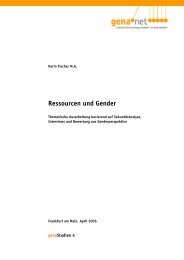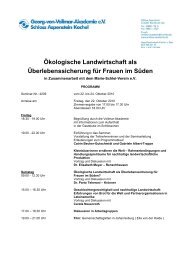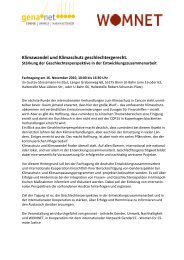Female, male, sustainable - genanet - Leitstelle GENDER ...
Female, male, sustainable - genanet - Leitstelle GENDER ...
Female, male, sustainable - genanet - Leitstelle GENDER ...
Create successful ePaper yourself
Turn your PDF publications into a flip-book with our unique Google optimized e-Paper software.
16<br />
HIGHLIGHTS<br />
“Renewable energy has come of age – were women just good enough to nurture it in its infancy?”<br />
<strong>genanet</strong> at the International Conference for Renewable Energies<br />
“Renewable energy has come of age – were women just<br />
good enough to nurture it in its infancy?” This question<br />
was asked in 1994 by a woman wind power expert, Rosemarie<br />
Rübsamen. During the early debates on renewable<br />
energy, women were at the forefront – particularly in local<br />
initiatives against nuclear energy. However, as renewable<br />
energy became more established, more traditional patterns<br />
prevailed.<br />
Even though <strong>genanet</strong> is active primarily in Germany,<br />
it is also involved in the international arena, such as<br />
the International Conference for Renewable Energies<br />
(renewables2004), which took place in Bonn 2004.<br />
Which aspects of renewable energy are gender sensitive?<br />
How can the interests of both women and men be met<br />
better in this subject area? Taking a closer look at the<br />
Conference, further specific questions came up: What<br />
was the proportion of women to men at renewables2004?<br />
A conference can only be conceptualised in a genderequitable<br />
way if there is a relatively balanced ratio of<br />
women and men in all planning, considerations of content<br />
and presentations. It also requires that gender experts are<br />
included and consulted. Joining forces with other experts,<br />
<strong>genanet</strong> already advocated on these issues during the<br />
preliminary stages of preparations for the Conference.<br />
It was a success that on the International Steering Committee,<br />
there were 28 per cent women, an unusually high<br />
number in the energy sector, though on the National<br />
Advisory Committee, the proportion of women was only<br />
18 per cent. <strong>genanet</strong> established definitive benchmarks<br />
for the content of the conference by issuing a thematic<br />
background paper titled “Gender Equity and Renewable<br />
Energies”, and by its involvement in the Multi-Stakeholder-<br />
Dialogue via the Stakeholder Group “Women”.<br />
renewables2004<br />
renewables2004 dealt with one central issue:<br />
How can the share of modern renewable energy<br />
be significantly increased in industrial and<br />
developing nations and how can renewables’<br />
potentials and advantages be harnessed more<br />
effectively? 3.600 participants came to Bonn,<br />
among them government delegations with ministers<br />
of energy, environment and development,<br />
as well as representatives of the United Nations<br />
and other international organisations, nongovernmental<br />
organisations, civil society and<br />
the private sector.


